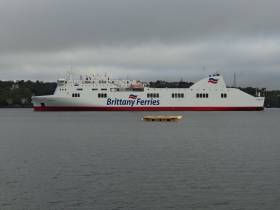Displaying items by tag: Enters Service
A second 6,000dwt LNG dual-fuel tanker for James Fisher and Sons plc based in Barrow-in-Furness, Cumbria on the Irish Sea has been delivered.
The newbuild Lady Maria Fisher will be traded by James Fisher Everard (JFE) alongside its existing fleet which operates tankers along the European coastline (incl. (Whitegate) Cork -Galway) and in the Caribbean islands.
This new vessel is an addition to the Sir John Fisher, which joined their fleet in November 2022.
Equipped with highly efficient dual-fuel engines, both tankers are able to run on liquified natural gas (LNG) as a cleaner alternative to conventional marine gasoil.
The two vessels also incorporate innovations in design and construction technology to further enhance hydrodynamic performance, to improve operational efficiency, reduce greenhouse gas (GHG) emissions and improve local air quality.
Their extensive, centralised waste heat recovery systems also help to minimise GHG emissions.
Each vessel is capable of achieving a 45 percent reduction in carbon emissions, in addition to a 93 percent reduction in NOx and 45 percent reduction in SOx. The vessels will reduce the fleet’s overall GHG emissions and will also help customers looking to contribute to sustainability improvements.
Lady Maria Fisher was built and launched at China Merchants Jinling (CMJL) shipyard in Yangzhou, China. The tanker is currently transporting vegetable oil from Vietnam to Europe, where it will then be processed into bio-diesel.
The newbuild pair will replace two of James Fisher’s existing tankers and will be able to carry more cargo. Both vessels have been specifically designed for restricted access ports around the coastline of Northern Europe, which will enable JFE to better service existing long-term contracts.
The addition of LNG dual-fuel capability to the fleet helps the Group contribute to the International Maritime Organisation's (IMO) GHG reduction targets as well as supporting its own environmental goals and those of its customers.
#FerryNews - Brittany Ferries new chartered Connemara has completed a maiden voyage overnight from Cork however instead of arriving in Roscoff, the ropax ferry diverted to Brest from where the ship this afternoon has just berthed, writes Jehan Ashmore.
The 500 passenger /195 car capacity Connemara was originally intended to launch Brittany Ferries much anticipated new first ever Ireland-Spain direct ferry route on 29 April (since revised to this Wednesday, 9 May). As for the debut of Connemara, circumstances dictated otherwise, with the ropax ferry picking up a pilot this afternoon prior to berthing at Brest as a temporary port.
Connemara was scheduled to depart Cork yesterday mid-afternoon but did not vacate the berth at Ringaskiddy until after midnight, today. The long delays encountered in the Irish port were due to a mandatory survey of the Brittany Ferries chartered-in Cypriot flagged ropax. The surveys were carried out by (DTTAS) Department of Transport, Toursism and Sport.
Officials from DTTAS through their division, the Marine Survey Office (MSO) part of Irish Maritime Administration (IMA) carried out a survey inspection of the 186m Connemara. The surveying of the 27,415 gross tonnage ferry was to satisfy national and international legislation in relation to safety of shipping requirements prior to the certification of the 2007 Visentini built ropax.
The reason for Connemara's change of Breton port today was because Roscoff only has a single ro-ro-ramp which since this morning was occupied by the same operator's Armorique. The cruiseferry arrived overnight from Plymouth on schedule and remained in port until a departure this mid-afternoon bound for Cornwall.
According to Brittany Ferries, foot passengers booked on today's Connemara return sailing to Cork have been advised of a bus connection departing Roscoff (17.00) to transfer those to Brest from where the sailing tonight, Tuesday, 8 May departs at 19.00.
As previously alluded, Connemara was originally to have begun service on the new Ireland-Spain route. The 'économie' no-frills Cork-Santander service as previously reported on Afloat was delayed due to technical works forcing Connemara to dry-dock in Santander. The setback saw the original launch date of the first sailing on the new continental connection, from Santander to Cork on April 29 revised to last Sunday of this May Bank Holiday weekend (but this too was cancelled).
Due to Connemara's operational route diagram, the ropax still departed Spain on Sunday (without passengers or freight) to Cork. The Brittany Ferries ship, the first named with an Irish name, made an inaugural arrival to Cork Harbour yesterday morning. At 08.00 Afloat monitored the Connemara pass the backdrop of Cobh before berthing in Ringaskiddy Ferry Terminal.
The terminal is also where flagship, Pont-Aven routinely operates cruiseferry based Cork-Roscoff sailings. Cruiseferry sailings are from Cork every Saturday, returning from France on Friday's. Connemara's introduction but also based on the 'économie' service will boost capacity on the Ireland-France route. When sailings settle in, they will operate from Cork every Monday and from Roscoff on Tuesday's.
As mentioned the new Ireland-Spain service begins with a Cork-Santander sailing scheduled from the Irish port tomorrow morning at 11.00. This continental connection to Cantabria, in northern Spain, offers two overnight sailings each week with departures from Cork on a Wednesday and Friday and departures from Santander on a Thursday and Sunday.
Among passengers booked on tomorrow's maiden Ireland-Spain sailing are fans of Leinster Rugby. The province having reached the final of the European Champions Cup play French team Racing 92 from Paris.
Irish fans after disembarking in Santander will head east to the next major sea port city of Bilbao, Biscay, where the San Mamés Stadium is the venue for the sporting finale taking place this Saturday, 12 May.
On another Irish-Iberian connection, if our entry for the Eurovision Song Contest succeeds in tonight's semi-finals, we could also be cheering on at the final of the Eurovision Song Contest. This takes place also on Saturday but in neighbouring, Portugal at the Altice Arena in the capital Lisbon.






























































